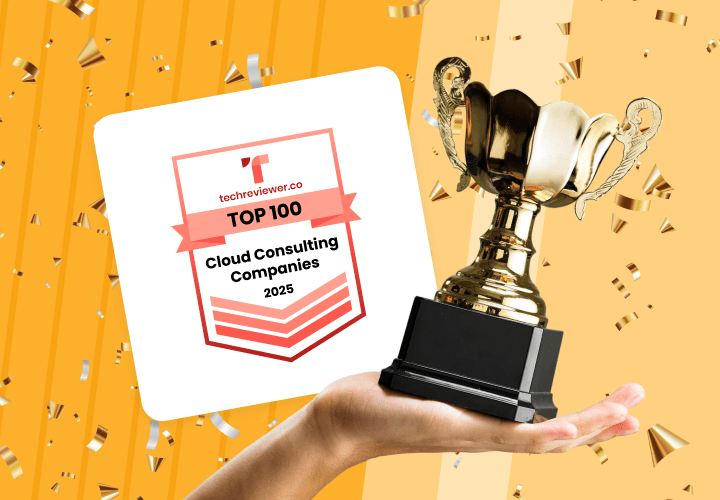Cloud-Based ERP: Types, Benefits, and Best Technology Solutions (2025)
Table of contents
- Cloud ERP Market Statistics
- Cloud vs On-Premises
- Cloud ERP Types
- Public Cloud ERP
- Private Cloud ERP
- Hybrid Cloud ERP
- Community Cloud ERP
- Benefits of Cloud ERP
- Cost Efficiency
- Accessibility and Flexibility
- Scalability and Integration
- Enhanced Data Security
- Improved Collaboration and Communication
- Enhanced Business Intelligence
- Industry Use Cases
Manufacturing Industry
Retail and E-commerce
Healthcare Industry
Professional Services
Education Sector
- Challenges of Cloud ERP Implementation
Data Migration and Integration
Customization and Configuration
Change Management and User Adoption
Security and Data Privacy
Scalability and Flexibility
- Conclusion
The dynamic landscape of modern business demands agile and efficient solutions, and Enterprise Resource Planning (ERP) systems have become essential for managing core organizational functions. As companies seek to optimize operations, enhance productivity, and gain a competitive edge, cloud-based ERP solutions have emerged as a transformative force. By migrating from traditional on-premises installations to cloud platforms, businesses can unlock new levels of flexibility, scalability, and cost-effectiveness.
This article delves into the world of cloud ERP, exploring the various types of solutions available, their myriad benefits, and real-world applications across diverse industries. We'll examine the leading software options, discuss the challenges organizations may face during implementation, and provide insights to guide your cloud ERP journey.
Cloud ERP Market Statistics
According to Statista, the projected global revenue for cloud ERP is expected to reach $40.5 billion by the year 2025, a report by Computer Weekly reveals that 53% of decision-makers consider cloud ERP to be their top investment priority. Furthermore, a study conducted by IDC indicates that more than two-thirds of organisations have expedited their transition to cloud ERP solutions.
Cloud ERP solutions have gained traction across organizations of all sizes. Small and medium-sized enterprises (SMEs) have particularly embraced the cloud ERP trend due to its affordability and ease of implementation. Research by Gartner indicates that by 2025, 80% of SMEs will have migrated to cloud-based ERP systems, highlighting the growing significance of cloud ERP in the business landscape.
North America currently dominates the Cloud ERP market, owing to the presence of major ERP solution providers and early adoption by organizations in the region. However, Asia Pacific is expected to witness the highest growth rate during the forecast period. The rising number of SMEs and the increasing focus on digital transformation initiatives in countries like China and India are driving the market's growth in this region.
Cloud vs On-Premises
The decision to choose between on-premises and cloud ERP solutions is a critical one for businesses. Both deployment methods offer distinct advantages and disadvantages, and the optimal choice depends on the specific needs and priorities of the organization.
On-premises ERP systems provide greater control, security, and customization options but require substantial upfront investment and ongoing maintenance. Conversely, cloud ERP solutions offer cost-effectiveness, scalability, and remote accessibility but may raise concerns regarding data security and vendor dependency.
Ultimately, the decision should be based on a comprehensive evaluation of factors such as budget, IT infrastructure, business requirements, risk tolerance, and long-term strategic goals. By carefully weighing the pros and cons of each approach, businesses can make informed decisions that align with their overall objectives and pave the way for future growth and success.
Cloud ERP Types
Cloud-based ERP solutions offer a range of deployment options to suit diverse business needs and priorities. For organizations seeking dedicated resources, enhanced security, and greater customization, single-tenant cloud ERP provides a compelling solution. With dedicated infrastructure, each organization enjoys isolated data storage and the freedom to tailor the system to their specific requirements. This approach prioritizes data privacy and flexibility, making it ideal for businesses with stringent security or unique operational needs.
On the other hand, multi-tenant cloud ERP offers a cost-effective alternative by utilizing a shared infrastructure. This model allows businesses to access robust ERP functionality without the burden of significant upfront investments and ongoing maintenance. While customization options may be somewhat limited compared to single-tenant solutions, multi-tenant cloud ERP remains an attractive option for organizations seeking affordability and ease of deployment.
Additionally, some businesses opt for a hybrid approach, combining on-premises and cloud-based components to create a tailored solution that maximizes flexibility and control.
Public Cloud ERP
Public cloud ERP is a type of cloud-based system where the software and infrastructure are owned and managed by a third-party provider. In this model, multiple organizations share the same resources, resulting in cost savings and scalability. Public cloud ERP offers a high level of accessibility, as users can access the system from anywhere with an internet connection. Additionally, the provider handles system maintenance and updates, allowing businesses to focus on their core competencies.
Private Cloud ERP
Private cloud ERP, on the other hand, provides dedicated resources exclusively for a single organization. This type of ERP system is hosted on-premises or in a data center specifically designed for the organization's needs. Private cloud ERP offers enhanced security and control over data, making it an ideal choice for companies with strict compliance requirements or sensitive information. While private cloud ERP can be more expensive than public cloud systems, it provides greater customization options and agility.
Hybrid Cloud ERP
Hybrid cloud ERP combines the best of both worlds by integrating public and private cloud systems. In this model, organizations can store their sensitive data on a private cloud while utilizing the scalability and cost-effectiveness of public cloud resources for other functions. Hybrid cloud ERP allows businesses to maintain control over critical data while leveraging the flexibility and scalability of public cloud services. This type of ERP system is particularly beneficial for organizations with fluctuating workloads or complex data management needs.
Community Cloud ERP
Community cloud ERP is a shared infrastructure that caters to a specific industry or group of organizations with similar needs. This type of ERP system fosters collaboration and knowledge sharing within a community, enabling organizations to address industry-specific challenges effectively. By pooling resources and expertise, community cloud ERP offers cost savings, industry best practices, and specialized functionalities tailored to the unique requirements of the community.
Benefits of Cloud ERP
Cloud-based ERP solutions offer several benefits that can revolutionize an organization's operations:
Cost Efficiency
Cloud ERP eliminates the need for large upfront investments in hardware, software, and IT infrastructure. With a subscription-based model, businesses can access the software and its functionalities through the cloud, significantly reducing capital expenditure. Moreover, cloud-based ERP systems typically offer flexible pricing plans, allowing companies to scale their operations seamlessly without incurring additional costs.
Accessibility and Flexibility
Cloud ERP solutions provide users with anytime, anywhere access to critical business data. With a secure internet connection, employees can log in to the ERP system from various devices, including laptops, tablets, and smartphones. This accessibility ensures that employees stay connected and can perform their tasks efficiently, regardless of their physical location. Additionally, cloud ERP platforms can be easily customized and tailored to meet specific business requirements, offering utmost flexibility to adapt as the company grows.
Scalability and Integration
As businesses evolve, their ERP requirements change as well. Cloud ERP solutions are designed to scale effortlessly, allowing companies to add or remove functionalities as needed. This scalability ensures that the ERP system can accommodate growing business demands without disruptions. Furthermore, cloud ERP platforms are built to integrate seamlessly with other business applications, such as CRM, HR, and supply chain management systems. This integration enables real-time data exchange, eliminating manual data entry and reducing errors.
Enhanced Data Security
Data security is a top priority for businesses of all sizes. Cloud ERP solutions offer advanced security measures, including data encryption, firewalls, and regular backups, to safeguard critical business information. Cloud service providers employ dedicated security teams that constantly monitor and update security protocols to protect against potential cyber threats. Moreover, cloud ERP solutions ensure data redundancy, minimizing the risk of data loss due to hardware failures or natural disasters.
Improved Collaboration and Communication
Cloud ERP systems foster collaboration and communication across different departments and teams within an organization. With real-time data access, employees can share information, collaborate on projects, and make informed decisions collectively. This enhanced collaboration leads to improved productivity, reduced delays, and streamlined workflows.
Enhanced Business Intelligence
Cloud ERP solutions come equipped with robust reporting and analytics capabilities. These tools enable businesses to gain valuable insights into their operations, identify trends, and make data-driven decisions. By consolidating data from various sources, cloud ERP platforms provide a comprehensive view of the business, empowering management to optimize processes, identify areas for improvement, and drive growth.
Industry Use Cases
Cloud ERP has found widespread adoption across multiple industries.
Manufacturing Industry
Cloud ERP systems have transformed the manufacturing landscape by streamlining complex processes and increasing efficiency. Manufacturers can now seamlessly integrate their production, inventory management, and supply chain operations into a single platform. Real-time data tracking enables better demand forecasting, optimized inventory levels, and improved production planning. With cloud ERP, manufacturers can achieve leaner operations, reduce costs, and enhance customer satisfaction.
Retail and E-commerce
The retail and e-commerce sectors have witnessed a significant shift towards cloud ERP to stay competitive in the digital age. Cloud-based solutions offer real-time inventory management, enabling retailers to track stock levels accurately, automate replenishment, and avoid stockouts. Additionally, cloud ERP provides comprehensive sales and customer data, allowing retailers to gain valuable insights for targeted marketing campaigns and personalized customer experiences.
Healthcare Industry
Cloud ERP solutions have revolutionized the healthcare industry by streamlining administrative processes, improving patient care, and enhancing data security. Cloud-based medical ERP systems enable seamless integration of patient records, billing, and scheduling, eliminating paperwork and reducing errors. Healthcare providers can easily access patient information, track medical histories, and streamline billing processes, resulting in improved patient outcomes and operational efficiency.
Professional Services
Cloud ERP systems have proven to be invaluable for professional service firms, including consulting, legal, and accounting firms. These organizations can streamline project management, resource allocation, and billing processes using cloud-based ERP. By centralizing time tracking, expense management, and invoicing, professional service firms can enhance project profitability, optimize resource utilization, and deliver superior client service.
Education Sector
Cloud ERP has transformed the education sector, enabling educational institutions to streamline administrative tasks, improve student outcomes, and enhance collaboration. Cloud-based ERP solutions automate student enrollment, fee management, and academic records, eliminating manual paperwork and reducing administrative overhead. Furthermore, cloud ERP facilitates seamless communication between teachers, students, and parents, fostering a collaborative learning environment.
Challenges of Cloud ERP Implementation
While cloud ERP offers numerous benefits, its implementation can present certain challenges. Data migration from legacy systems to a cloud-based environment can be complex and time-consuming, requiring careful planning and thorough testing. Organizations must also ensure that their network infrastructure can handle the increased bandwidth requirements of cloud ERP systems. Additionally, there might be concerns about data security and compliance, necessitating robust measures to protect sensitive information. Proper training and change management initiatives are crucial to ensure a smooth transition and maximize user adoption.
Data Migration and Integration
One of the significant challenges in cloud ERP implementation is the seamless data migration from legacy systems to the cloud. Data integrity, accuracy, and compatibility are crucial aspects that need to be carefully considered. It is essential to conduct a thorough data audit, identify relevant data sets, and develop a robust data migration plan. Collaborating with experienced professionals and utilizing reliable data integration tools can simplify this process and ensure a smooth transition.
Customization and Configuration
Every business has unique processes and requirements, making customization and configuration a critical challenge in cloud ERP implementation. While cloud ERP systems offer a wide range of features and functionalities, aligning them with your specific needs may require custom ERP development. It is essential to strike a balance between customization and standardization to avoid excessive complexity and future maintenance issues. Engaging with ERP consultants and involving key stakeholders early in the process can help identify customization needs and streamline configuration.
Change Management and User Adoption
Introducing a new cloud ERP system often requires significant changes in workflows, processes, and user roles. Resistance to change and lack of user adoption can hinder successful implementation. To overcome this challenge, organizations should invest in comprehensive change management strategies. This includes effective communication, training programs, and involving end-users in the decision-making process. Regular feedback loops and continuous support during and after implementation are crucial to ensure user acceptance and overall success.
Security and Data Privacy
With cloud ERP implementation, organizations entrust their sensitive data to third-party service providers. Ensuring robust security measures and data privacy compliance is essential. Organizations should carefully evaluate the security protocols and certifications of their cloud ERP vendors. Implementing multi-factor authentication, data encryption, and regular security audits can help mitigate security risks and protect valuable business information.
Scalability and Flexibility
Cloud ERP systems offer unparalleled scalability and flexibility, allowing businesses to adapt to changing needs and growth. However, challenges may arise when it comes to scaling up or down the system as per business requirements. It is crucial to choose a cloud ERP solution that aligns with future growth plans and offers scalability options. Regularly reviewing and optimizing system performance and capacity can help maintain flexibility and ensure seamless operations.
Conclusion
As businesses strive to stay competitive in the digital era, cloud-based ERP systems have emerged as a game-changer. The different types of cloud ERP solutions offer organizations unparalleled flexibility, scalability, and cost-effectiveness. From streamlining operations to improving decision-making, the benefits of cloud ERP are undeniable. Industry-specific examples highlight the positive impact cloud ERP has on various sectors. By choosing the best cloud ERP software that aligns with their requirements, organizations can reap the full benefits of this transformative technology.
Although cloud ERP implementation may present challenges, careful planning, and proactive measures can help overcome these hurdles. Embracing cloud-based ERP is undoubtedly a strategic move for businesses looking to optimize their operations and drive growth in the digital age.
Updated on Feb 9, 2025





